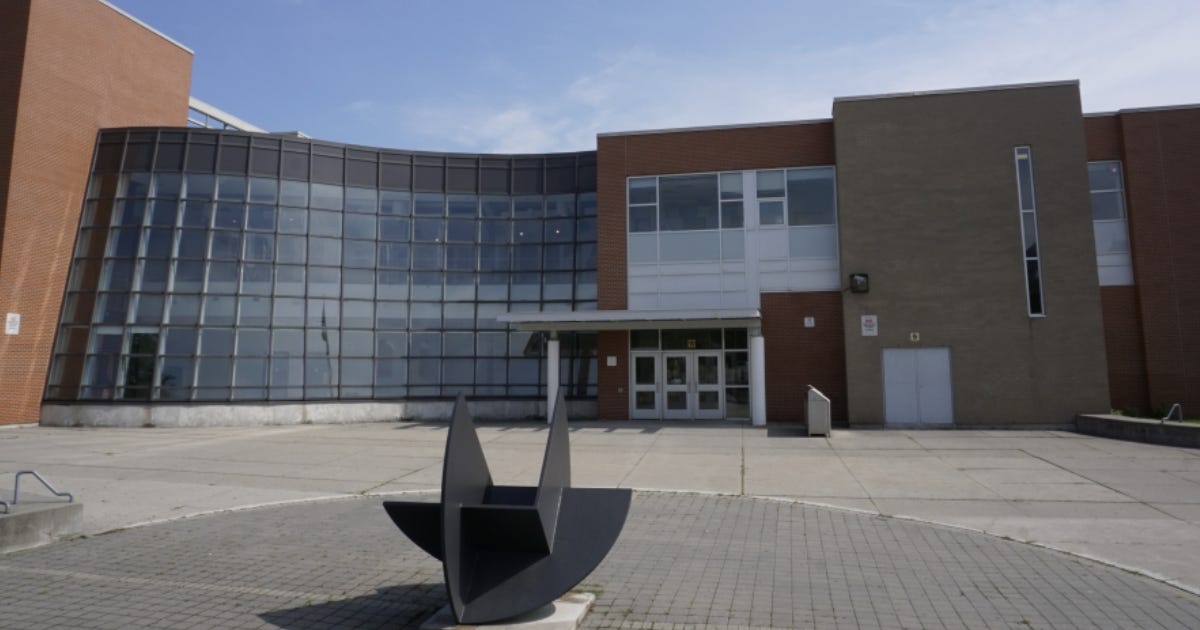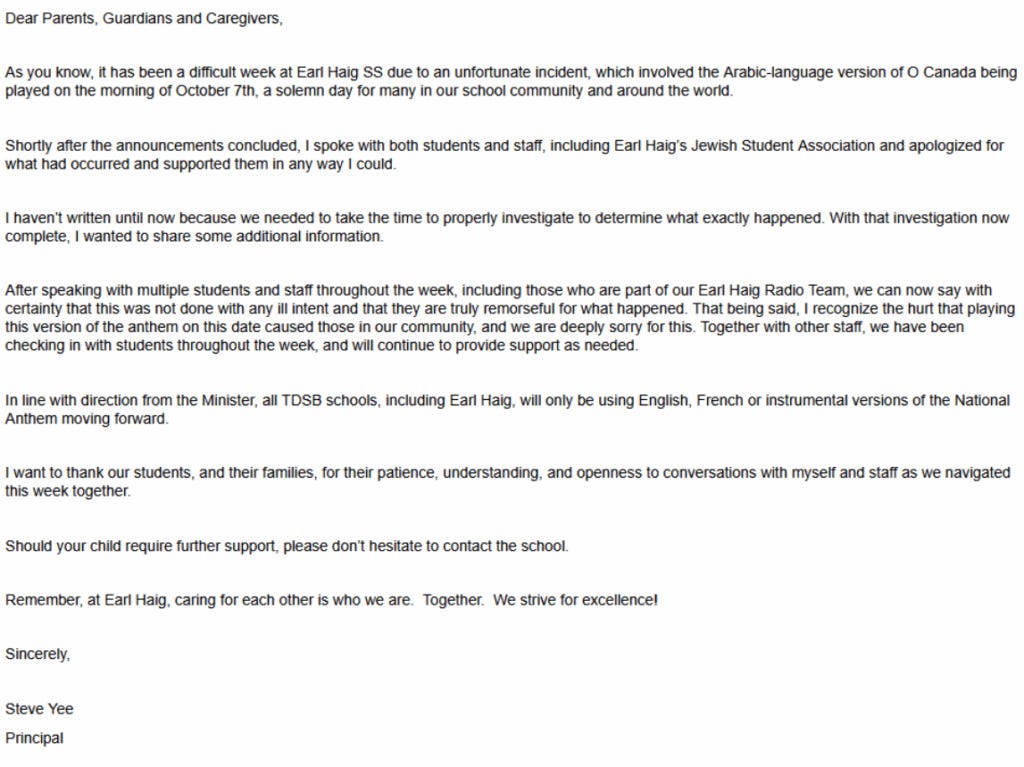Jewish parents furious, unconvinced by principal’s Arabic ‘O’Canada’ “apology”
When Earl Haig Secondary School in Toronto played ‘O Canada’ in Arabic on the second anniversary of the Hamas attacks on Israel, the principal called it an “unfortunate incident.”
When Earl Haig Secondary School in Toronto played ‘O Canada’ in Arabic on the second anniversary of the Hamas attacks on Israel, the principal called it an “unfortunate incident.” The education minister accepted that explanation. For many Jewish parents, it was the final straw.
In an email sent to families two days after the incident, principal Steve Yee said playing the Arabic version had “not been done with ill intent” and that students involved were “truly remorseful.” He apologized for “the hurt caused,” describing it as an “unfortunate incident” and promised that, going forward, only English, French, or instrumental versions of the anthem would be used.
Three Jewish mothers who spoke to True North said the incident exposed a growing pattern of antisemitism in Ontario schools that boards, principals, and the ministry keep apologizing for, but never fix.
“It’s not a mistake when adults are in charge,” said Vicky Moscoe, a Jewish parent in the Earl Haig community. “The so-called mistake actually traumatized our entire community on a very traumatic day. They aren’t taking into account the damage that’s been done.”
Moscoe said her trust in the Toronto District School Board has collapsed. “This is another TDSB with egg on their face, sweeping it under the carpet and not acknowledging the trauma that our community has gone through at their hands,” she said.
She described learning of earlier incidents at the school, including graffiti and a student yelling “Free Palestine” during last year’s graduation ceremony. “There have been swastikas in the girls’ washrooms,” she said. “It’s not the first time.”
For Moscoe, the apology sent to parents this week only made things worse. She wanted the principal to address the entire school, explaining why what happened was wrong, and to use the moment as a chance for education. “By talking behind closed doors to a handful of people, you’re telling everyone it’s okay,” she said. “It was a missed opportunity to lead, to guide, and to make amends.”
Her view is echoed by Sarah Rabinovitch, a Jewish parent in the York Region District School Board who said what happened at Earl Haig reflects a province-wide failure.
“I equate this situation to gun violence in the States,” she said. “Every time something happens, people deflect, they say it’s a misunderstanding, and then they send thoughts and prayers. It’s the same thing here. Something wildly inappropriate happens, everyone apologizes, the province says, ‘do better,’ and then nothing happens.”
Rabinovitch said she’s exhausted by a system that has normalized antisemitic incidents without consequences. “I don’t want another empty apology. I want to hear, ‘We did something wrong, here’s what we’re going to do so it never happens again.’ Someone should be fired, educated, something. But instead, it’s always, ‘Oops, our bad.’”
Her comments reflect the broader picture documented in Deborah Lyons’ report on antisemitism in K–12 education, released earlier this year. The former ambassador found Jewish students facing “systemic patterns of bias and exclusion” across multiple Ontario boards, including the TDSB, and warned that school systems were failing to recognize antisemitism within their diversity and equity policies.
Those concerns resonate with Alyson Gampel, another Jewish Earl Haig parent, who once believed in the Diversity, Equity and Inclusion model but now says it has “gone wrong.”
“What came from good intent is being hijacked,” Gampel said. “There’s subversive indoctrination happening in little ways—curriculum changes, the way issues are framed—and it’s creating a culture that’s not about inclusion anymore.”
Her daughter heard the anthem that morning. “When you tell kids it was an honest mistake, you’re telling them it’s okay to do it again,” she said.
Gampel described finding a swastika on the floor of the school last November. “They cleaned it up quickly, but there was no message condemning it. Nothing publicly saying that hate has no place here.”
She said she was initially hopeful when Education Minister Paul Calandra condemned the anthem incident, promising to “take action” if boards disrespected Canada’s national symbols. “He came out strong,” she said. “But when the time came to follow through, he accepted the apology and said we can move on. That’s the message our kids are getting—there are no consequences.”
Calandra told the Toronto Star this week that he accepted the TDSB’s explanation, calling the Arabic anthem “a mistake.” His office said it was time to create an environment that “brings people together and not one that divides people.”
Parents like Gampel say that attitude is what has allowed the problem to grow. “It’s not just about one day or one song,” she said. “It’s about Jewish families being left out of the conversation. Our kids are being told that their pain doesn’t matter, that it’s easier to move on than to face what’s happening.”
For many, the Earl Haig incident has become a symbol of a deeper cultural shift in public education.
“It’s Groundhog Day,” said Rabinovitch. “Every time, they promise to learn, to listen, to do better. But there’s never any action. The kids see it, the parents see it, and the hate keeps coming back.”





They don't have to be convinced since the apology was a fake.
This abomination to our National Anthem should never have happened in the first place.
While we are certainly more than tolerant and accepting of the multiplicity of languages spoken by the people who wish to come here to better their lives and contribute to Canada there should be some limitations on the language used for some things.
Certainly Canada's National Anthem is one of those things.
Canada has two official languages.
PERIOD... END.. FULL STOP.
The only two languages that our Anthem should be allowed to be played in.
As a true borh Canadian who has lived peacefully with our jewish brothers ans sisters, I apologize for the persecution you all have experienced since allowing foreigners into our beloved Canada who hate you because you are Jews and my brothers and sisters who are Christian. As Canadian Christians and you who are Canadian Jews we have lived in relative peace for decades until now. We are so saddened by the abuse you have experienced and the public calls for your destruction. While our PM and his party sit back and do nothing. That is so shameful. I personal apology to every Jew for our allowing this to happen in Canada.